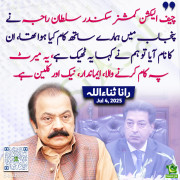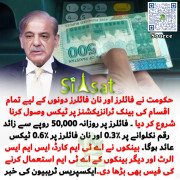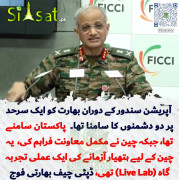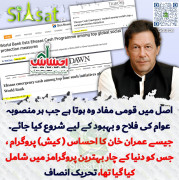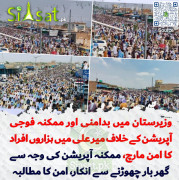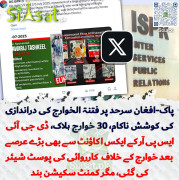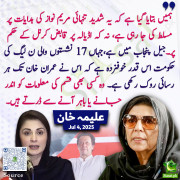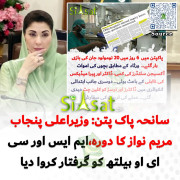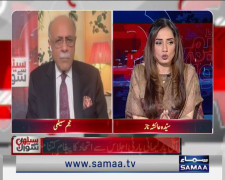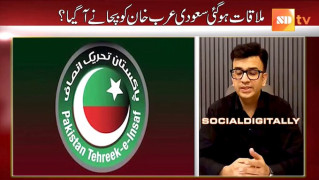Khalid
Minister (2k+ posts)
Out of its four-year rule, the year 2011 proved the most crucial to the PPP government which not only had to combat internal and external challenges but also faced massive threat of split in its cadres, resulting out of jialas annoyance with the incumbent leadership.
The assassination of important government figures, like Punjab governor Salman Taseer; break-up of coalition with the PML-N in Punjab over Raymond Davis issue; May 2 incident of Abbottabad; destruction of important military assets in terrorists attack on Mehran Air Base; corruption scandals involving notable figures; flood of Sindh; key party figures defection to the PTI; drone attacks, frequent gas and electricity crisis; confrontation with the judiciary over various matters; gang war and target killings in Karachi; sectarian violence and other grievances of people of Balochistan; NATO strikes; and mysterious departure and return of President Zardari after suffering health problems, posed huge challenges to the PPP in the ongoing year.
However, the party managed to have another year in power and successfully passed fourth budget consecutively despite several speculations regarding its replacement with a caretaker setup or military take-over. Now, the party is aiming at winning the Senate polls in March 2012, which, according to the party stalwarts, will give significant strength to the PPP.
The years first blow to the PPP-led government was the assassination of Punjab governor Salman Taseer by his security guard, Mumtaz Qadri. The governor was killed on charges of committing blasphemy.
Taseers killing was a huge setback to the PPP which not only lost a vocal figure in Punjab but also had to come under immense pressure from religious figures who warned the government against supporting any act related with amendment to the existing blasphemy law.
The government had not yet recovered from the shock of Taseer killing when another important figure, religious affairs minister Shahbaz Bhatti, was also killed within a couple of months by unknown assailants in Islamabad.
The PPP government had to pass through a difficult time when its relationship with the USA entered a crucial phase, after an American citizen, allegedly an agent of black water, Raymond Davis killed two Pakistanis near Qurtaba Chowk, Mozong, Lahore. Another citizen, Ibad ur Rehman, also lost his life after he was run over by a vehicle coming to rescue Raymond Davis from the angry mob. The PPP government had to remain under massive criticism after some of the party members were divided over the issue of diplomatic immunity to the American national. Both the PPP and the PML-N, the ruling party of Punjab where the sad incident occurred, remained busy in leveling charges against each other. Shah Mehmood Qureshi quit as foreign minister for contradicting with his own party members. Qureshi had asserted that Davis did not enjoy diplomatic immunity and his statement not only cost him his office but also created a gulf between him and his incumbent leadership. Finally, he quit the PPP, resigned from the seat of MNA and joined the PTI.
In the beginning of the year, the PPP government was literally put on ventilator when the MQM, one of its key allies, bade it farewell in protest of not being taken into consultation over important affairs.
The PPP government, in order to maintain its significant majority in the National Assembly where it has 127 members, had to make one of the most controversial compromise by joining hands with the PML-Q, the party which was termed Qatil league by none other than PPP co-chairman Asif Zardari himself after the assassination of Benazir Bhutto in 2007.
This decision came as a shock to many but most of the PPP members associated with the ruling cadre endorsed it as, according to them, it was the best way to get rid of the MQM which had never proved a trustworthy ally.
Interestingly, some months later, the MQM once again joined the fold of the government coalition.
The PPP government had to face one of the most crucial period in May, when the most wanted person of the world and chief of Al Qaeda, Osama Bin Laden, was killed in Abbottabad in a raid by the US troops.
The presence of Osama Bin Laden in Pakistan had put a great question mark over the relations between the USA and Pakistan. Besides, the incident was also an eye opener for many in America.
In the same month, the federal government had to face a severe setback when Mehran navel base was attacked by militants, causing huge loss to the assets including important aircrafts like Orion.
Meanwhile, the murder of Professor Burhan ud Din Rabbani also severed ties between Afghanistan and Pakistan.
The country somehow enjoyed relatively better ties with India this time whom it granted the status of Most Favourite Nation. It also acquired its support in winning the non permanent seat at the UN. Prime Minister Gilani also had two important meetings with Indian Prime Minister Man Mohan Singh - one in Mohali, India, and second at Addu, Maldives, on the eve of SAARC conference. On the occasion, both leaders agreed to solve the issue by continuing the dialogue process.
The government had another challenge in waiting in the mid of this year when massive rains caused tremendous damage to human and livestock population besides destroying agriculture.
The PPP government remained under sharp criticism not from the opposition but from its own stalwarts who slammed the federal and provincial governments for taking no concrete measures for the relief, rehabilitation of the flood afectees. The flood had caused damage in 21 districts of Sindh but the districts of Badin, Khairpur, Naushero Feroze, Umer Kot were hit very hard, causing loss of billions of rupees.
The security situation in Karachi remained a visible question mark on the performance of the PPP government which, despite being the ruling party of Sindh, could not control the incidents of target killing. The increasing number of target killing incidents claiming the lives of activists of ANP, PPP and MQM finally forced the government to deploy Rangers in the commercial capital of the city.
The presence of Rangers somehow resulted in the improvement of situation in Karachi but the PPP government once again witnessed a blow after Zulfiqar Mirza, one of the close confidants of President Zardari, at a press conference in August, not only exposed some secret anti Pakistan deal allegedly involving MQM but also slammed a key figure of the present government, interior minister Rehman Malik, for being a key player behind the prevailing crisis in Pakistan. Later, Zulfiqar Mirza, who is also the husband of National Assembly speaker Dr Fehmida Mirza, also resigned from the seat of MPA and the party office.
The PPP also had to face split in its ranks in Punjab, after Shah Mehmood Qureshi, ending his nearly two-decade long affiliation with the PPP, joined the PTI and resigned from the slot of the MNA. Two PPP MPAs including Abbas Raan and Dr Akhter Malik also formed a dissident group. However, Dr Akhter sorted out his differences with the party, later.
The PTI wave also deprived the PPP from one of its MPAs as Khurrem Ali Khan of Attock also joined Imran Khan after resigning as MPA.
According to sources, the PPP is likely to face some more defections.
In November, the Pak US relations once again entered a crucial stage after a check post of Pak Army at Salalah, Mohmand Agency was attacked by NATO helicopters, killing 24 soldiers of the Pak Army. The act of American aggression was widely condemned, with the Defence Cabinet Committee deciding to not only boycott the Bonn Conference but also blocking the fuel supply to the NATO forces. Besides, the US was also asked to vacate Shamsi Air Base. The air base was vacated by the US within 15 days.
The PPP government had another huge challenge in waiting in the form of the memo scandal in which one of the key men of President Zardari, Hussain Haqqani, Pakistani ambassador to the USA, had to resign allegedly for being involved in the controversial memo.
The already bad situation for the party got worse after the memo issue was taken to the Supreme Court by Mian Nawaz Sharif. In the wake of this episode, the mysterious departure of Zardari from the country for health issues also gave rise to several speculations. It also raised several questions on the future of the PPP government.
President Zardari, however, returned to Pakistan after spending nearly half a month abroad but the government was still under pressure from various fronts over the memo issue.
Talking to The News, Qamar Zaman Kaira, Secretary Information of the PPP, said the party had been facing challenges but it had emerged successful out of so many crises. He added the PPP government had tried to create consensus among political forces over core issues.
Leader of the House in Senate, Syed Nayyar Hussain Bokhari, said it was an achievement for an elected civilian government to pass its fourth budget. He said an elected government had had passed the budget after a long period in history. Moreover, he added, it was the PPP government under which legislation about reinstatement of dismissed employees and protection of women was done.
He admitted that there were severe challenges but the government had turned them into opportunities and continued to work for national interest.
http://www.thenews.com.pk/TodaysPrintDetail.aspx?ID=83734&Cat=5&dt=12/23/2011

The assassination of important government figures, like Punjab governor Salman Taseer; break-up of coalition with the PML-N in Punjab over Raymond Davis issue; May 2 incident of Abbottabad; destruction of important military assets in terrorists attack on Mehran Air Base; corruption scandals involving notable figures; flood of Sindh; key party figures defection to the PTI; drone attacks, frequent gas and electricity crisis; confrontation with the judiciary over various matters; gang war and target killings in Karachi; sectarian violence and other grievances of people of Balochistan; NATO strikes; and mysterious departure and return of President Zardari after suffering health problems, posed huge challenges to the PPP in the ongoing year.
However, the party managed to have another year in power and successfully passed fourth budget consecutively despite several speculations regarding its replacement with a caretaker setup or military take-over. Now, the party is aiming at winning the Senate polls in March 2012, which, according to the party stalwarts, will give significant strength to the PPP.
The years first blow to the PPP-led government was the assassination of Punjab governor Salman Taseer by his security guard, Mumtaz Qadri. The governor was killed on charges of committing blasphemy.
Taseers killing was a huge setback to the PPP which not only lost a vocal figure in Punjab but also had to come under immense pressure from religious figures who warned the government against supporting any act related with amendment to the existing blasphemy law.
The government had not yet recovered from the shock of Taseer killing when another important figure, religious affairs minister Shahbaz Bhatti, was also killed within a couple of months by unknown assailants in Islamabad.
The PPP government had to pass through a difficult time when its relationship with the USA entered a crucial phase, after an American citizen, allegedly an agent of black water, Raymond Davis killed two Pakistanis near Qurtaba Chowk, Mozong, Lahore. Another citizen, Ibad ur Rehman, also lost his life after he was run over by a vehicle coming to rescue Raymond Davis from the angry mob. The PPP government had to remain under massive criticism after some of the party members were divided over the issue of diplomatic immunity to the American national. Both the PPP and the PML-N, the ruling party of Punjab where the sad incident occurred, remained busy in leveling charges against each other. Shah Mehmood Qureshi quit as foreign minister for contradicting with his own party members. Qureshi had asserted that Davis did not enjoy diplomatic immunity and his statement not only cost him his office but also created a gulf between him and his incumbent leadership. Finally, he quit the PPP, resigned from the seat of MNA and joined the PTI.
In the beginning of the year, the PPP government was literally put on ventilator when the MQM, one of its key allies, bade it farewell in protest of not being taken into consultation over important affairs.
The PPP government, in order to maintain its significant majority in the National Assembly where it has 127 members, had to make one of the most controversial compromise by joining hands with the PML-Q, the party which was termed Qatil league by none other than PPP co-chairman Asif Zardari himself after the assassination of Benazir Bhutto in 2007.
This decision came as a shock to many but most of the PPP members associated with the ruling cadre endorsed it as, according to them, it was the best way to get rid of the MQM which had never proved a trustworthy ally.
Interestingly, some months later, the MQM once again joined the fold of the government coalition.
The PPP government had to face one of the most crucial period in May, when the most wanted person of the world and chief of Al Qaeda, Osama Bin Laden, was killed in Abbottabad in a raid by the US troops.
The presence of Osama Bin Laden in Pakistan had put a great question mark over the relations between the USA and Pakistan. Besides, the incident was also an eye opener for many in America.
In the same month, the federal government had to face a severe setback when Mehran navel base was attacked by militants, causing huge loss to the assets including important aircrafts like Orion.
Meanwhile, the murder of Professor Burhan ud Din Rabbani also severed ties between Afghanistan and Pakistan.
The country somehow enjoyed relatively better ties with India this time whom it granted the status of Most Favourite Nation. It also acquired its support in winning the non permanent seat at the UN. Prime Minister Gilani also had two important meetings with Indian Prime Minister Man Mohan Singh - one in Mohali, India, and second at Addu, Maldives, on the eve of SAARC conference. On the occasion, both leaders agreed to solve the issue by continuing the dialogue process.
The government had another challenge in waiting in the mid of this year when massive rains caused tremendous damage to human and livestock population besides destroying agriculture.
The PPP government remained under sharp criticism not from the opposition but from its own stalwarts who slammed the federal and provincial governments for taking no concrete measures for the relief, rehabilitation of the flood afectees. The flood had caused damage in 21 districts of Sindh but the districts of Badin, Khairpur, Naushero Feroze, Umer Kot were hit very hard, causing loss of billions of rupees.
The security situation in Karachi remained a visible question mark on the performance of the PPP government which, despite being the ruling party of Sindh, could not control the incidents of target killing. The increasing number of target killing incidents claiming the lives of activists of ANP, PPP and MQM finally forced the government to deploy Rangers in the commercial capital of the city.
The presence of Rangers somehow resulted in the improvement of situation in Karachi but the PPP government once again witnessed a blow after Zulfiqar Mirza, one of the close confidants of President Zardari, at a press conference in August, not only exposed some secret anti Pakistan deal allegedly involving MQM but also slammed a key figure of the present government, interior minister Rehman Malik, for being a key player behind the prevailing crisis in Pakistan. Later, Zulfiqar Mirza, who is also the husband of National Assembly speaker Dr Fehmida Mirza, also resigned from the seat of MPA and the party office.
The PPP also had to face split in its ranks in Punjab, after Shah Mehmood Qureshi, ending his nearly two-decade long affiliation with the PPP, joined the PTI and resigned from the slot of the MNA. Two PPP MPAs including Abbas Raan and Dr Akhter Malik also formed a dissident group. However, Dr Akhter sorted out his differences with the party, later.
The PTI wave also deprived the PPP from one of its MPAs as Khurrem Ali Khan of Attock also joined Imran Khan after resigning as MPA.
According to sources, the PPP is likely to face some more defections.
In November, the Pak US relations once again entered a crucial stage after a check post of Pak Army at Salalah, Mohmand Agency was attacked by NATO helicopters, killing 24 soldiers of the Pak Army. The act of American aggression was widely condemned, with the Defence Cabinet Committee deciding to not only boycott the Bonn Conference but also blocking the fuel supply to the NATO forces. Besides, the US was also asked to vacate Shamsi Air Base. The air base was vacated by the US within 15 days.
The PPP government had another huge challenge in waiting in the form of the memo scandal in which one of the key men of President Zardari, Hussain Haqqani, Pakistani ambassador to the USA, had to resign allegedly for being involved in the controversial memo.
The already bad situation for the party got worse after the memo issue was taken to the Supreme Court by Mian Nawaz Sharif. In the wake of this episode, the mysterious departure of Zardari from the country for health issues also gave rise to several speculations. It also raised several questions on the future of the PPP government.
President Zardari, however, returned to Pakistan after spending nearly half a month abroad but the government was still under pressure from various fronts over the memo issue.
Talking to The News, Qamar Zaman Kaira, Secretary Information of the PPP, said the party had been facing challenges but it had emerged successful out of so many crises. He added the PPP government had tried to create consensus among political forces over core issues.
Leader of the House in Senate, Syed Nayyar Hussain Bokhari, said it was an achievement for an elected civilian government to pass its fourth budget. He said an elected government had had passed the budget after a long period in history. Moreover, he added, it was the PPP government under which legislation about reinstatement of dismissed employees and protection of women was done.
He admitted that there were severe challenges but the government had turned them into opportunities and continued to work for national interest.
http://www.thenews.com.pk/TodaysPrintDetail.aspx?ID=83734&Cat=5&dt=12/23/2011



